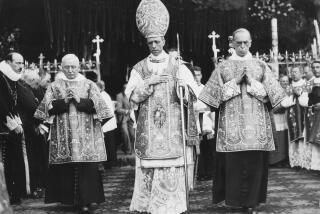Linking Crimes to Hussein a Tough Job
- Share via
WASHINGTON — It will take months of sifting through the millions of documents left behind by Saddam Hussein’s regime before they can be presented in a trial of the deposed leader, a panel of Iraqi experts said Wednesday.
Among the documents are letters and autobiographical records written by former Baathist leaders that describe crimes against Iraqis carried out under Hussein, said members of the Iraq Memory Foundation, a Baghdad-based organization that is analyzing about 6 million records chronicling Hussein’s years in power.
Foundation officials, who spoke at a forum at the conservative American Enterprise Institute, said there was no “smoking gun” within the collection. Rather, the data serve as an accounting of Hussein’s use of the Baath Party as a “tool of control” that penetrated and brutalized every level of society, said Hassan Mneimneh, director of the organization’s documents project.
The Baathist government “can’t simply be reduced to individuals, tyrants and dictators who lasted,” said Kanan Makiya, the organization’s founder. “There is an enormous paper record of this regime. We need to indict the entire system that [Saddam] created and that created him.”
But connecting the dots back to Hussein is not an easy task, Mneimneh said, because many of the documents portray him as not directly linked to offenses and shield him from criminal acts carried out under his orders, the experts said.
The documents do offer some specifics, officials said. For instance, much of the data point to Ali Hassan Majid, a Hussein cousin responsible for carrying out the 1988 military campaign to quash the Kurdish rebellion in northern Iraq during the Iran-Iraq war. Documents show that Hussein authorized Majid’s role in the operation, in which tens of thousands of Kurds either disappeared or were executed.
More to Read
Sign up for Essential California
The most important California stories and recommendations in your inbox every morning.
You may occasionally receive promotional content from the Los Angeles Times.













